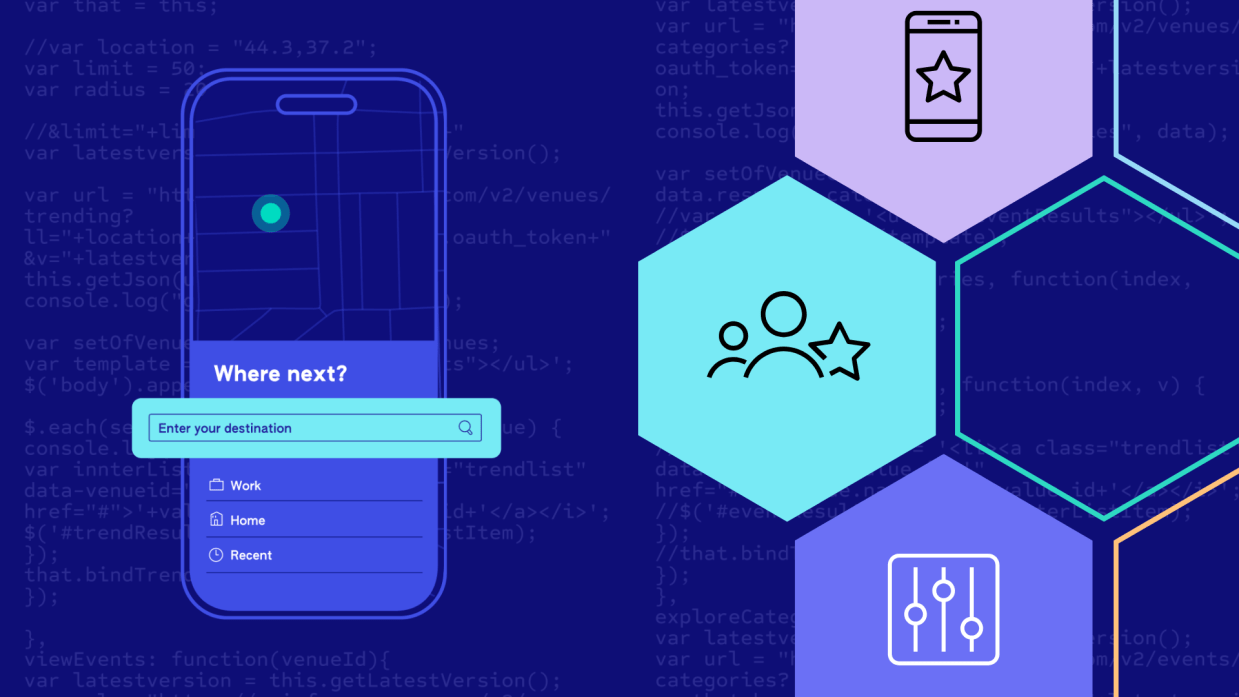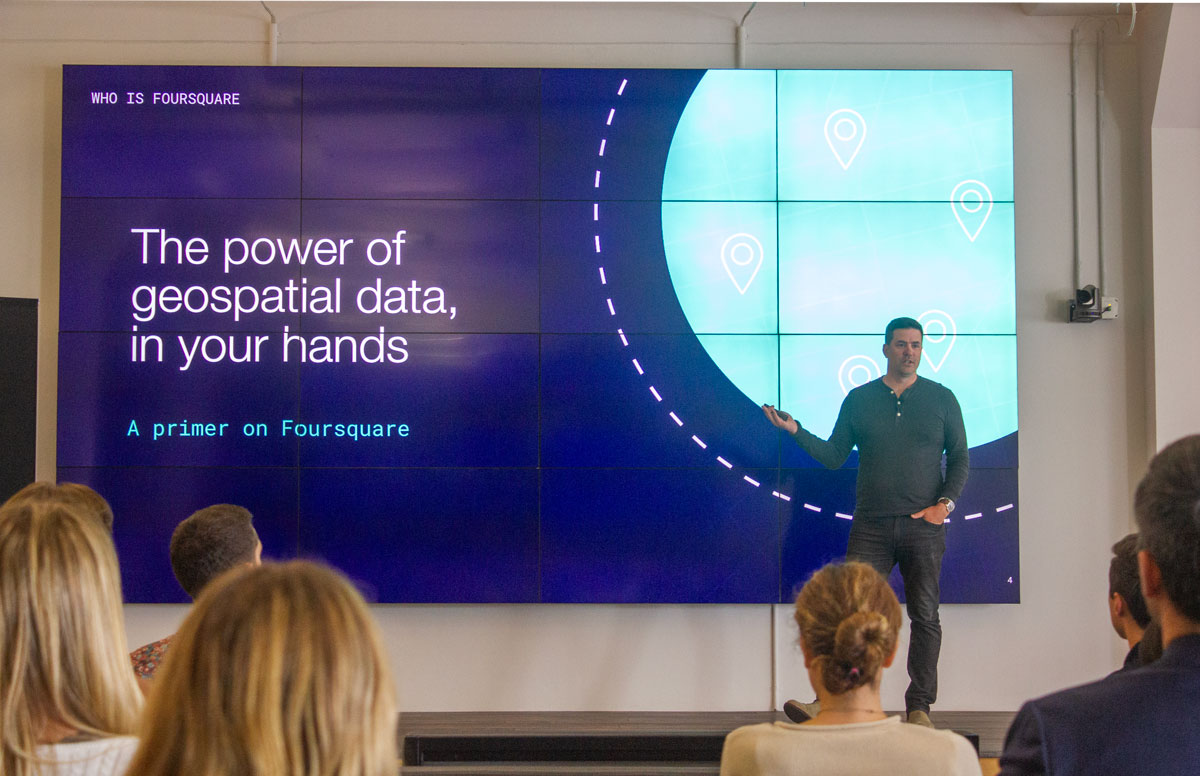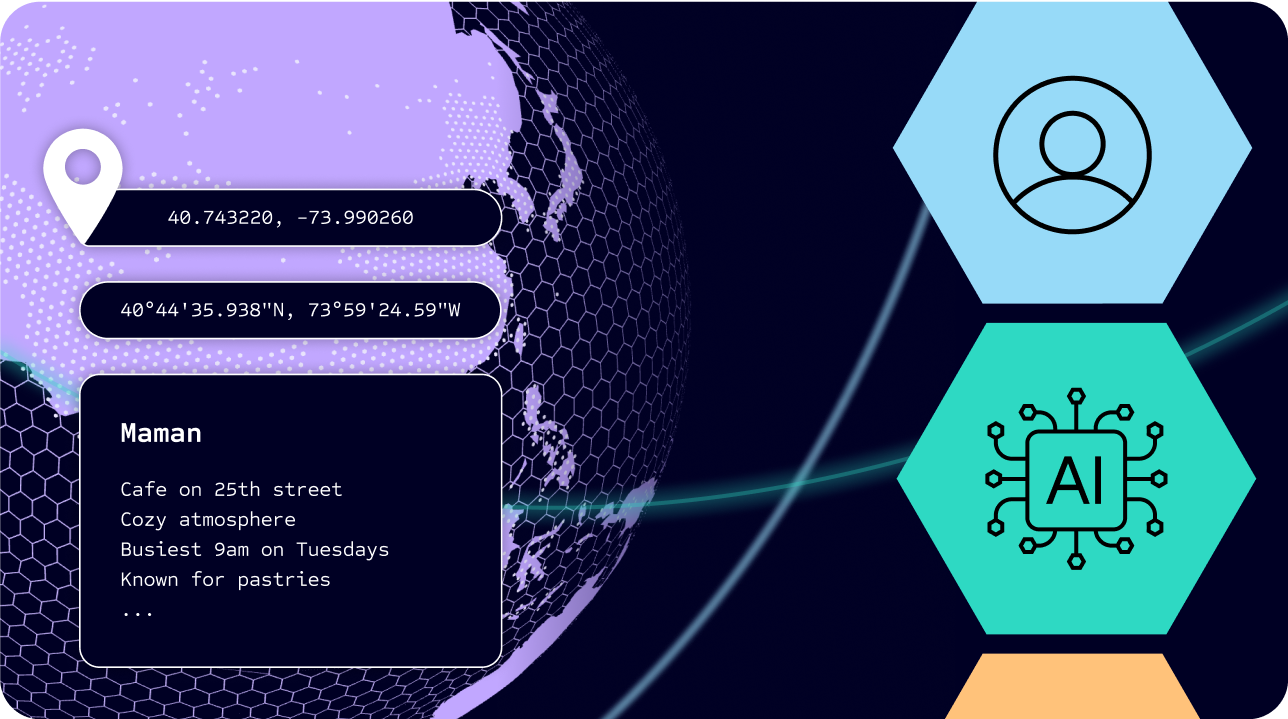Personalization is a key consideration for brands to maintain a competitive advantage. It provides tailored recommendations and customized messaging to enhance the customer experience. In turn, the likelihood of customers returning for more increases, ensuring growth.
APIs offer a unique opportunity for real-time personalization. For example, Foursquare’s Places API gathers location data from multiple sources and presents it to users to help them find points of interest (POI). Developers can leverage specific types of APIs to build apps that offer personalized experiences to their end-users. These are referred to as Personalization APIs. Learn more about how these APIs work, their various types, and use cases from Foursquare.
Understanding APIs
First, what is an API? An API, or application programming interface, is a set of rules and protocols that allows different software applications to communicate with each other. It defines the methods and data formats that applications can use to request and exchange information, enabling seamless interaction between diverse systems and services. APIs are fundamental in enabling the integration of software components, facilitating the development of complex applications, and enabling access to external services and resources.
On the server side, APIs save time because they prevent needing to create capabilities from scratch. If one application doesn’t have a feature that another one does, the API allows software to share this feature.
There are various structures for APIs, including composite, internal, partner, and open. Modern APIs are designed for HTTP domains to allow easy access and compatibility with Javascript and most other programming languages. They have the JSON format and follow REST principles.
What Is a Personalization API?
If you’re like most businesses, your data warehouse is already filled to the brim with information about customers, products, and more. Personalization APIs enable you to use this data more effectively by providing quick access to any information.
These low-latency APIs provide SaaS applications and similar sources with access to user profiles. Developers can interact with the stored data for each user to tailor experiences. This empowers other API capabilities, including:
- Setting administrative functions to review user experience (how users receive content)
- Importing/exporting user data to and from other sources into the Personalization API
- Sending information about users and their activities
- Enabling integration between Personalization APIs and websites
- Sending real-time notifications when users enter different locations
How Does Foursquare’s Personalization API Work?
In today’s hyper-personalized world, end-users and consumers expect custom experiences in their day-to-day life. However, for app builders, it takes time and resources to build location-based functionalities that rely on a combination of quality places data and user-generated content, while also being compliant to data privacy regulations. Foursquare’s Personalization API helps developers seamlessly build location-driven features into their applications in order to drive personalized experiences to end-users without having to develop these applications from scratch or set up a new technical team.
The Personalization API builds off the key features of Foursquare’s Places API. Our Places APIs provide app developers with global POI (points of interest) data, plus content from thousands of reliable sources. This information powers real-time discovery, venue search, and ranking.
As with our Places API, Foursquare offers a location-based Personalization API with various endpoints. These include:
Personalized Search
Personalized search provides users with places based on the keywords they enter and where they are. Results are filtered further according to the category and the user’s preferences. API endpoints include:
- Search for nearby venues: Finds venues of interest when a user enters a set radius
- Search venue recommendations: Provides recommended venues based on users’ queries and locations
- Search for autocomplete: Offers autocomplete search options based on the query
- Search for geo autocomplete: Supplies geographic autocomplete search options according to the user’s query
Discovery
Discovery helps users find new venues based on their location history and popular POI. They collect interactions from billions of users to provide more intelligent venue recommendations according to their current location, nearby and similar venues, personal preferences, consumer behavior, and popular places nearby. Ultimately, discovery endpoints enable more personalized experiences. Endpoints include:
- Get venue attributes: Provides the characteristics of a chosen venue
- Get venue categories: Delivers the complete list of categories Foursquare uses for venues
- Get venue details: Provides more details about a chosen venue
- Get venue hours: Shows users the hours of operation for the chosen venue
- Get venue photos: Displays images of or from within the chosen venue
- Get venue tips: Offers reviews of the chosen venue to let users know what to expect
- Get trending venues: Leverages customer data and consumer behavior trends for smart venue recommendations
- Get related venues: Determines popular nearby venues by finding the places with the most visitors
- Rate a venue: Allows users to review venues and to hone in on recommendations
User-Generated Content (UGC)
User-generated content provides social proof, which is integral to conversions. App developers can also use it to create personalized experiences. These APIs deliver smarter location searches with photos, reviews, and more to help users find POI.
Our user-generated content capabilities do more than build credibility with your users. They also allow apps to gather feedback from recommendations and develop persona profiles. This strengthens market segmentation and targeting. Machine learning enables better analysis of ratings for insight into consumer trends. Foursquare’s exclusive Tastes library allows users to tag preferences for greater personalization. Additionally, these endpoints offer information about user preferences to create targeted content.
Endpoints for user-generated content include:
- Check-ins: Allows users to check into a venue, which boosts engagement while also building stronger persona profiles
- Lists: Enables users to create customized lists for different categories, such as places they’d like to travel, local favorites, and itineraries
- Photos: Provides images to visualize the venue
- Tastes: Leverages Foursquare’s vast Tastes taxonomy for users to choose their own Tastes
- Tips: Offers users millions of venue-specific reviews for sharing their experiences
- Users: Allows brands to create Foursquare user profiles and link them with existing profiles
User Management and Privacy
While personalized experiences are important to end-users, data privacy remains a top concern. Foursquare’s Personalization API includes user management and privacy endpoints that enable developers to comply with global data and privacy regulations with simplified deletion and export options for Foursquare-managed end-user data.
Endpoints for User Management and Privacy include:
- Create managed user: Allows app builders to create a Foursquare-managed user for their apps
- Refresh managed user token: Refresh a Foursquare-managed user’s oath token
- Delete managed user: Delete a Foursquare-managed user from your app
- Request managed user data retrieval: Request the retrieval of a Foursquare-managed user’s data for export
- Check privacy request status: Check the current status of either a Foursquare managed user’s data export or deletion request
For more information about the features and benefits we offer, review our Personalization API reference docs.
Use Cases
We’ve seen the features a Personalization API offers, but how can brands use these to boost the customer experience on their apps? There are many use cases for a Personalization API; Foursquare highlights three top use cases:
Retail Rewards Apps
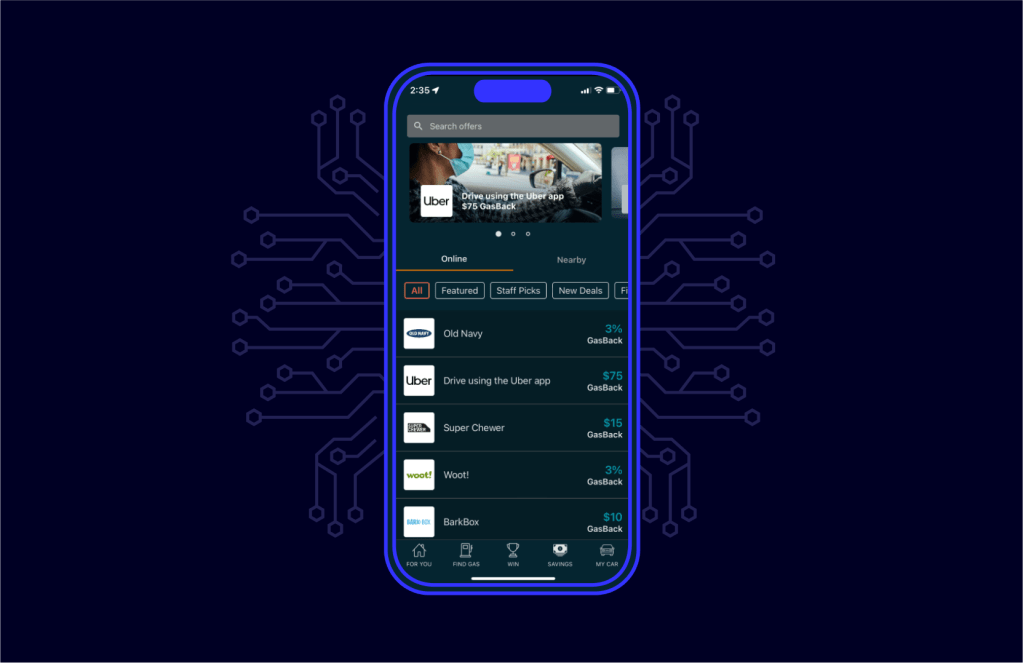
The combined capabilities of our Personalization API and Movement SDK enhances our retail rewards programs. Two endpoints are invaluable — Check-ins and Nearby Venue Search. Check-ins allow retail stores to provide discounts when their customers check into a venue. Nearby Venue Search helps in-store shoppers find deals at nearby locations and on other products.
Insight from the Movement SDK delivers rewards offerings at the right place and time. It identifies promotions at establishments with a close proximity and deals/coupons when users are in-store. It also helps with offline attribution by measuring footfall to venues and noticing behavioral shopping patterns.
Travel Recommendations Apps
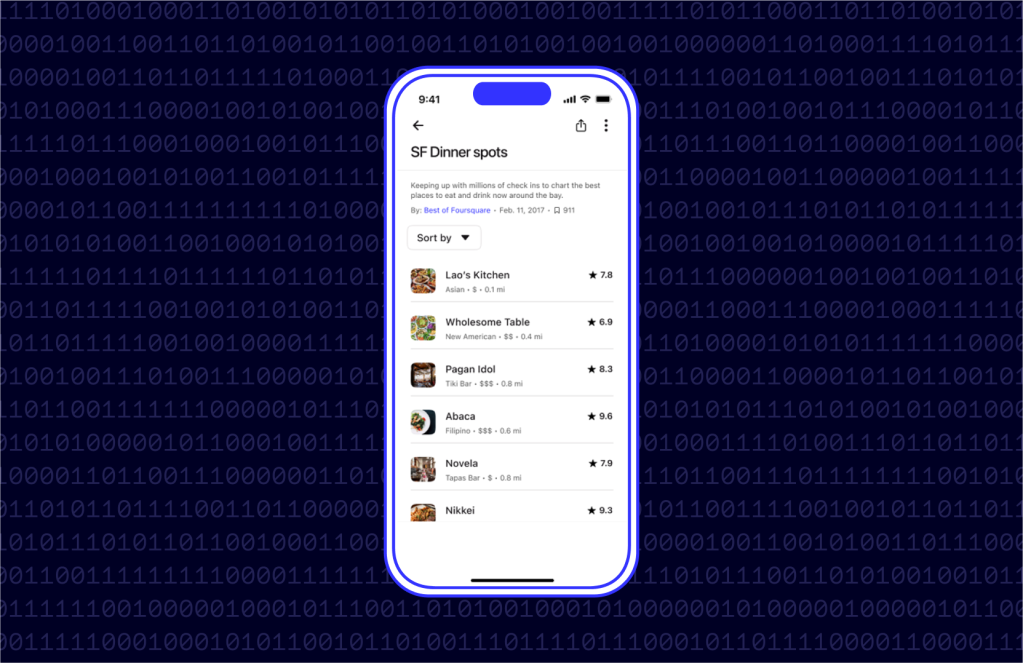
Offer travelers personalized recommendations with user-generated content and venue (discovery) endpoints. For example, the Lists endpoint allows users to tag favorite places or new venues to try for future visits. Venue endpoints suggest popular POI for a new destination. Features of our Movement SDK also enhance real-time travel recommendations.
Restaurant Recommendation Apps
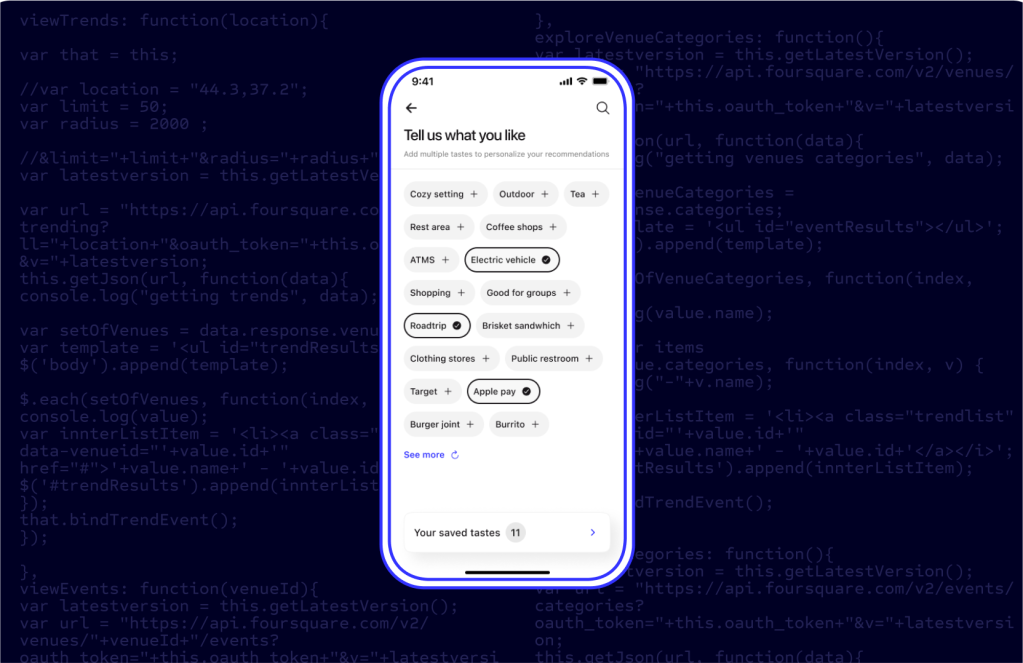
Provide a better customer experience with restaurant recommendation apps using our Personalization API. The Tastes endpoint helps during app onboarding to further engage end-users from the get-go. It integrates with your customer data platform (CDP) to create detailed user persona profiles. Personalized search increases credibility by recommending venues tailored to user preferences/interests. With our Movement SDK, apps provide the right messaging at the right place and time.
Trust Foursquare for the Personalization API
Real-time personalization with location-based features will set your app apart from the competition. Foursquare makes it possible with the Personalization API. Discover why thousands of developers from leading brands trust Foursquare.
Create a free Developer account to integrate personalization into your web and mobile app developments today.
Reviewed by: Princess Guzman
